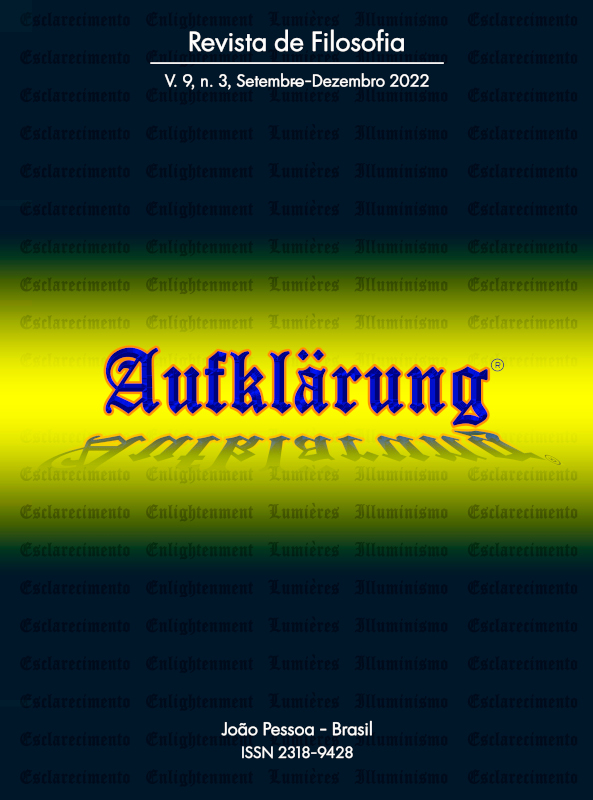[The positively indeterminate: Symbol as an entity of open meaning]
DOI:
https://doi.org/10.18012/arf.v9i3.62375Keywords:
Phenomenology of language, Symbol, Meaning, Mystical experienceAbstract
Martin Heidegger postulates the recovery of the creative power of the word as the fundamental task of phenomenology, identifying in poetry the conservation of this privileged form of relationship with language. The present work deals with language as a way of accessing the primordial spheres of being through an interpretation of mystical experiences as occasions for breaking the linguistic automatism that prevents seeing in the word something beyond a mere instrument for the transmission of information. Based on reflections on symbols developed by thinkers such as Gaston Bachelard, Paul Ricoeur, Mircea Eliade and Gershom Scholem, we propose a phenomenological conceptualization of the symbol as an entity of open meaning, whose origin refers to the positively indeterminate that constitutes the “object” of mystical experiences. Positively indeterminate is our expression for the divine, interpreting it as the source of all meaning that is, for that very reason, absent from any determined meaning, not because of a lack, but because of an excess of signification. The excess of signification is presented, then, as the key to a form of relationship with the word conceived as a force of creation.
Downloads
References
ALCORÃO. Os significados dos versículos do Alcorão Sagrado. Tradução Samir El Hayek. São Bernardo do Campo: Centro de Divulgação do Islam para a América Latina, 1989.
BACHELARD, Gaston. A poética do espaço. Tradução Antonio de Pádua Danesi. 2. ed. São Paulo: Martins Fontes, 2008.
BÍBLIA. A Bíblia de Jerusalém. São Paulo: Paulus, 2002.
CASSIRER, Ernst. Linguagem e mito. Tradução J. Guinsburg; Miriam Schnaiderman. 4. ed. São Paulo: Perspectiva, 2013.
CIUCU, Cristina. Langue sacrée et langue conventionnele: “Théories” du langage dans la tradition mystique juive. In: AYOUB, Georgine; GUETTA, Alessandro. (Org.). La langue et le sacré. Geuthner: Paris, 2017. p. 223-269.
DOGEN. Shōbōgenzō: The True Dharma-Eye Treasury, v. 1. Tradução Gudo Wafu Nishijima; Chodo Cross. Berkeley: Numata Center for Buddhist Translation and Reasearch, 2007.
ELIADE, Mircea. O Sagrado e o profano: A essência das religiões. Tradução Rogério Fernandes. 4. ed. São Paulo: WMF Martins Fontes, 2018.
HEIDEGGER, Martin. A caminho da linguagem. Tradução Marcia Sá Cavalcante Schuback. 6. ed. Petrópolis: Vozes; Bragança Paulista: Editora Universitária São Francisco, 2012.
HEIDEGGER, Martin. Hinos de Hölderlin. Tradução Lumir Nahodil. Lisboa: Instituto Piaget, 2004.
HEIDEGGER, Martin. Phänomenologie des religiösen Lebens. Frankfurt am Main: Vittorio Klostermann, 1995.
HEIDEGGER, Martin. Überlegungen VII-XI (Schwarze Hefte 1938-1939). Frankfurt am Main: Vittorio Klostermann, 2014.
KATZ, Steven. Mystical speech and mystical meaning. In: KATZ, Steven. (Ed.). Mysticism and language. Nova Iorque: Oxford University Press, 1992. p. 3-41.
LINGS, Martin. Le Prophète Muhammad: Sa vie d’après les sources les plus anciennes. Tradução Jean-Louis Michon. Paris: Éditions du Seuil, 1986.
NICHOLS, Sallie. Jung e o Tarô:Uma jornada arquetípica. Tradução Octavio Mendes Cajado. São Paulo: Cultrix, 2007.
RICOEUR, Paul. Le symbole donne à penser. Esprit, n. 275, v. 7 / 8, p. 60-76, jul. / ago. 1959.
RICOEUR, Paul. Teoria da interpretação: O discurso e o excesso de significação. Tradução Artur Morão. Lisboa: Edições 70, 2019.
SCHOLEM, Gershom. A cabala e seu simbolismo. Tradução Hans Borger; Jacob Guinsburg. 2. ed. São Paulo: Perspectiva, 2019.
SCHOLEM, Gershom. As grandes correntes da mística judaica. Tradução Jacob Guinsburg. 3. ed. São Paulo: Perspectiva, 1995.
TRAWNY, Peter. Adyton: A filosofia esotérica de Heidegger. Tradução Marcia Sá Cavalcante Schuback. Rio de Janeiro: Mauad X, 2013.
ZARADER, Marlène. A dívida impensada: Heidegger e a herança hebraica. Tradução Sílvia Meneses. Lisboa: Instituto Piaget, 1999.
Additional Files
Published
How to Cite
Issue
Section
License

This work is licensed under a Creative Commons Attribution 4.0 International License.
Journal general policy
1.This journal works under a Creative Commons License aplied to online journals. That icence can be read in the following link: Creative Commons Attribution 4.0 International (CC BY 4.0).
2.Accordingly to this License, a)the journal declares that authors hold the copyright of their articles without restrictions, and they can archieve them as post-print elsewhere. b)the journal allow the author(s) to retain publishing rights without restrictions.
Metadata Policy for information describing items in the repository
1. Anyone may access the metadata free of charge at anytime.
2.The metadata may be re-used in any medium without prior permission, even commercial purposes provided the OAI Identifier or a link to the original metadata record are given, under the terms of a CC BY license refered for the Journal.







































